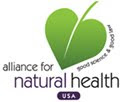For Immediate Release:
U.S. Contact: Gretchen DuBeau,
ph 800-230-2762
International Contact: Dr Robert Verkerk,
ph +44-1306-646-600
November 25, 2008
FDA’S LATEST THREAT TO DIETARY SUPPLEMENTS DEFIES THE DIETARY SUPPLEMENT HEALTH AND EDUCATION ACT ACCORDING TO TWO LEADING HEALTH FREEDOM GROUPS
Today, the American Association for Health Freedom (AAHF) and its international affiliate, the Alliance for Natural Health (ANH), jointly submitted comments to the US Food and Drug Administration (FDA) in response to its request for comments from industry and consumers to help them interpret recent changes to Section 912 of the Amendments Act of 2007 (FDAAA). The submission was accompanied by comments from 700 concerned citizens and practitioners exasperated over the latest threat to supplements from the FDA. The FDA’s unprecedented, controversial, and ambiguous changes to Section 912, specifically the addition of Section 301 (ll), may mean that all food products, including dietary supplements, could be barred from being marketed if they have been the subject of published clinical studies. AAHF and ANH point out that this provision is so far-reaching that a very large number of commonly consumed foods could be impacted by the new regulation and hence barred from interstate trade.
“If the FDA determines that Section 301 applies to dietary supplements, this would strangle innovation. It would create a ‘Catch 22’ situation in which supplement producers who undertake scientific research on new supplements will find that their very research will lead to a ban on the proposed supplement. This is totally senseless. This is too senseless even for the FDA,” said Gretchen DuBeau, AAHF Executive Director.
At the crux of the issue is whether the new Section 301 applies to dietary supplements, which are already covered by Section 201 (ff) of the Federal Food, Drug, and Cosmetic Act (FDCA). This means that Section 301 is in direct conflict with Section 201 of the FDCA that already governs dietary supplements through the Dietary Supplements Health and Education Act (DSHEA). DuBeau added:
“This conflict—which is supported by influential case law— gives Section 301 of the FDAAA no legal basis. Congressional language has already made clear and unambiguous that the FDAAA, currently under consideration, shall not affect the regulation of supplements under DSHEA.”
Section 201 currently also prevents the marketing of dietary supplements which have been subject to published clinical studies—but only when they have also been the subject of a Investigational New Drug (IND) application.
Dr Robert Verkerk, executive and scientific director of the ANH emphasized:
“Unlike Section 201 of the FDCA, the proposed new Section 301 of the FDA Amendments Act doesn’t just limit the ban to supplements that have been subject to drug applications, it applies a ban to some of the best researched and most useful supplements and ingredients on the market today. This is clearly nonsensical and if enforced, would represent one of the most severe restrictions seen in any country at any time.”
“There will be no shortage of big corporations that will exploit this situation to their benefit unless the scope of Section 301 is both clarified and narrowed”, commented Gretchen DuBeau, “one such company is already trying to use it to ban the natural zero-caloric sweetener stevia, given that stevia has been subject to scientific research and has been a thorn in the side of the sugar and artificial sweetener giants for years.”
Since the FDA’s call for comments issued on July 28, 2008, the AAHF sent an alert to its members, including professional, integrative medicine organizations, apprising them of the threat posed by the FDAAA’s Section 912. More than 700 concerned doctors and citizens emailed comments to AAHF, which accompanied the AAHF’s joint submission with ANH. Among the prestigious groups opposing the FDA’s erroneous interpretation are the International College of Integrative Medicine (ICIM), the American College for Advancement in Medicine (ACAM), The American Holistic Medical Association (AHMA), the Certification Board for Nutrition Specialists (CBNS), and the American College of Nutrition (ACN).
ENDS.





